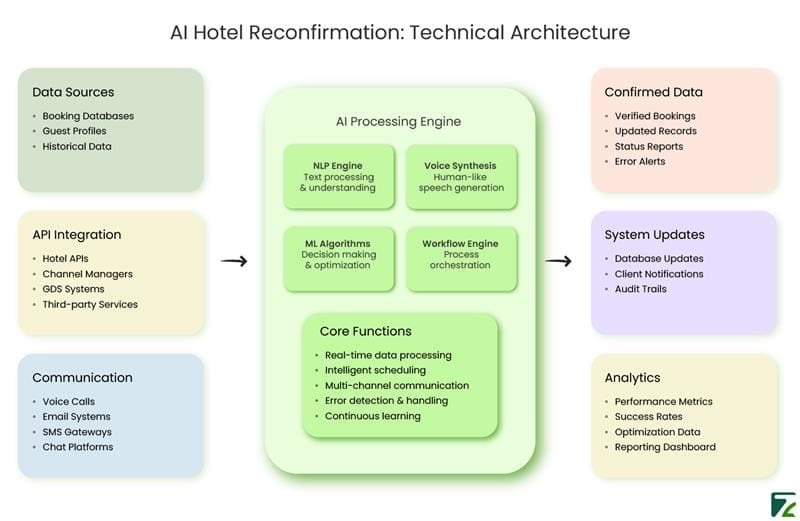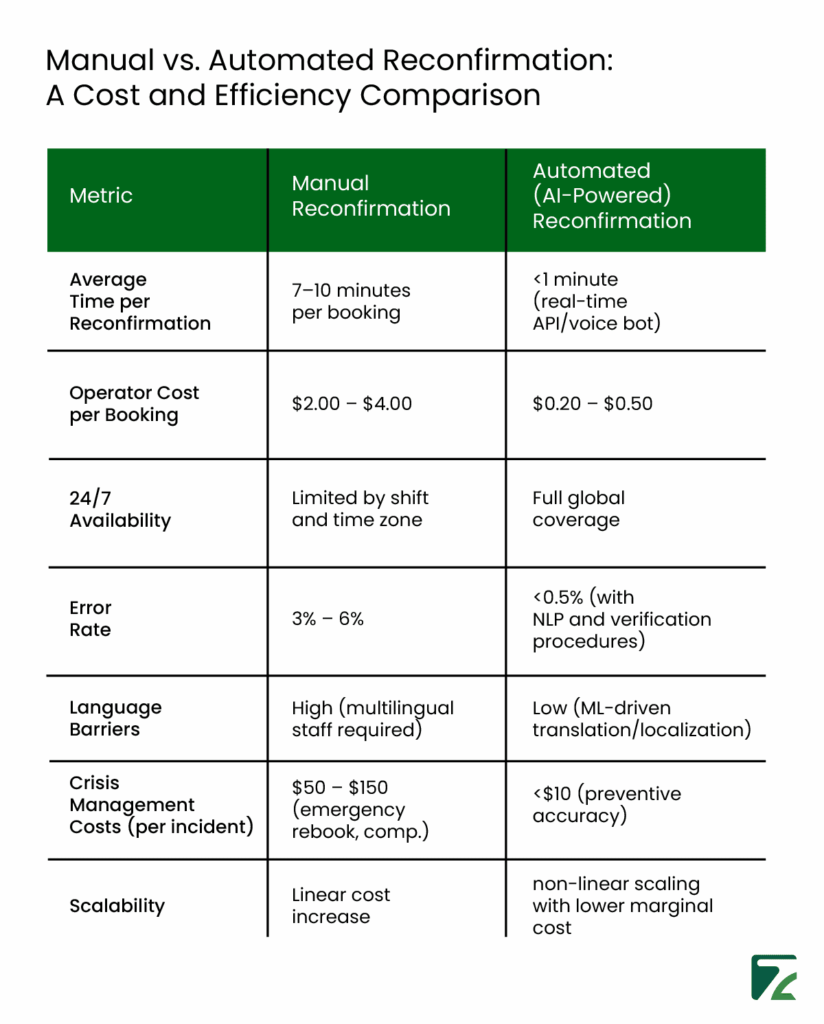The reconfirmation of the hotel booking is also seen as the historic bottleneck of operational efficiency among the travel agencies, between those who do not have cumbersome manual processes or those who do not have a clear understanding of the hotel booking. Although the travel industry has automated booking engines and revenue management systems, reconfirmation has stubbornly been a manual process until now.
Hotel Booking Reconfirmation Systems driven by AI are revolutionizing the way travel agents handle booking confirmation procedures. According to research, two-thirds (60%) of hotels and 70% of travel agencies will implement AI, marking a massive turning point in travel toward automation.
It’s not a matter of whether AI creates value; the data shows that it does. The issue is how fast travel agencies can operationalize these systems and gain a competitive advantage before competitors do.
Before looking at AI interventions, offline travel agencies would really first need to appreciate the monetary implications of the manual hotel booking reconfirmation. These expenses aren’t just staff time; they have cascading effects from there to your bottom line and your customer.
Conventional hotel booking reconfirmation works as a multilayered verification that demands much human coordination:
Booking Parsing: Travel agencies manually view Property Management System (PMS) records to parse guest information, room details, rate codes, and special requests based on a wide range of booking types and hotel partners.
Common Contact Protocol: Staff manages the maze of hotel contact protocols, from property phone systems to reservation departments via email. Every hotel group has its respective communication preferences and response times as well as verification processes.
Confirmation and Execution: Agents execute a complete call flow, verifying guest names, arrival and departure dates, room types, rates, and special arrangements, overcoming language barriers and understanding complex rate information.
Error Resolution: Conflicts are resolved immediately via rate negotiations, room type changes, or new accommodation options and can take numerous communication cycles.
There is a lot of extra cost related to manual hotel booking reconfirmation errors that go beyond labor. These may include emergency rebooking fees, customer compensation, loss of business relationships, and negative reputation affecting future bookings.
Automation systems show far superior processing speeds than the manual process, although the extent of improvement depends on the system applied and the size of the agency.
For companies handling large monthly hotel volumes, the following manual reconfirmation requirements are standard:
Online booking systems are rather advanced, but hotel booking reconfirmation is indeed required because the hospitality has a separate technology infrastructure. Unlike airline reservations systems tied each on PNR (Passenger Name Record), hotel bookings stream through multiple disconnected channels channel managers, extranets, property PMS systems at least one of which is usually out-to-date.
The inventory of hotels is distributed through 200+ online channels, which have different formats and timings of data updates. Property management systems are wide and varied which results in time lag for changes in inventory. One of the ways these gaps can be alleviated is through a confirmation tool that uses AI to confirm reservations across systems or by calling the hotels when APIs break, so there is no chance that anything gets “dropped on the floor”.

Hotel booking reconfirmation systems using AI are intricate compositions of various machine learning disciplines with workflows and touch points that automate and improve human-like communications.
AI hotel booking reconfirmation systems run complex multi-step workflows:
The operational differences between manual and AI-powered hotel booking reconfirmation represent fundamental improvements in accuracy, consistency, and scalability.

According to studies, as many as 60% of hotels and 70% of travel agencies intend to adopt AI. This common adoption results in network effects which magnify the benefits of individual agency through uniform protocols and better data quality.
The cost of software licensing, integration and staff training often represents the initial investment in AI technology deployment. The possible advantages are the shorter duration of manual work, the improvement of accuracy, and the increase in the system’s scalability.
Time scales of implementation and recouping of money differ greatly by agency size, technology installed, and means of deployment.
Zeal Connect is all-in-one hotel booking confirmation automation platform to transform the process for re-confirming hotel bookings. Their AI platform “solves the missing link between booking and guest arrival with transparent confirmation handling for travel agencies”.
Tech Platform: Zeal Connect’s platform integrates seamlessly to any existing system in the world. It has incorporated an inhouse automated reconfirmation model for an embarrassment of riches in a zero-manual intervention of phone calls while cutting the processing time for hours-to-minutes.
Results for the Business: As a result of Zeal Connects hotel booking re-confirmation automation platform, travel agencies can now work more efficiently and gain pay offs like more freedom for staff, no more booking mistakes, and have rest assured that a customer knows that they have confirmed exactly as they were told.
Industry Adoption Patterns :Top travel technology companies, including Amadeus and Sabre, are incorporating artificial intelligence features into updated platforms. Progressive hotel chains are rolling out communication systems that can hang with AI, while niche players like Zeal Connect is meant to take on specific operational pain points in the travel agency workflow.
AI hotel booking reconfirmation enables agencies to prevent costly booking issues that can ruin relationships with their customers, from overbooking and double booking to miscommunications that need to be resolved immediately and can affect customer satisfaction.
Reliable, accurate confirmation procedures also improve agency credibility among clients and hotel partners. Through AI double-checking to eliminate booking mistakes, agencies avoid bad reviews, costly last-minute rebooking on surge prices, and permanently disenchanted customers.
Service Level Benefits: With AI same-day bookings confirmations can be achieved and 24/7 reconfirmation services are available which manual processes can’t offer.
Scalability for Growth: Agencies with AI capabilities can manage bookings in the face of 10X growth, without hiring 10X the staff, so you can push the accelerator on your growth strategy.
Professional Credibility: Increased dependability results in new business and returning customers that multiply over time.
New AI hotel booking reconfirmation systems have advanced security features like end-to-end encryption, GDPR compliance, and role-based access controls. Advanced functionalities include Multilingual AI Voice Agent. Think of an AI voice that speaks like a human and talks in hotel’s language to manage operations globally in various markets.
AI hotel booking reconfirmation is a game changer of monumental proportions in travel agency service provision, from reacting and solving issues to proactively managing services. The technology is no longer in the experimental stages; it’s in commercially useful business tools that delivers tangible operational improvements and competitive benefits.
The travel agency services market is expected to grow to $1.4 trillion by 2035, and as AI automation enabled agencies benefit from network effects, they become increasingly difficult to catch. The decision to implement goes beyond cost/benefit, as travel agencies must ask themselves if they can afford to not implement AI hotel booking reconfirmation as customer expectations change and competition in the space heats up.
For travel agencies, the question is not if AI hotel booking reconfirmation will be adopted, research indicates 60% of hotels and 70% of TMCs intend to introduce AI, but how fast they can deploy such systems in order to take advantage of first-mover benefits in an age of increasingly automated travel collaboration.
The agencies that succeed will be those who adopt AI not as a substitute for human judgment, but as a multiplier, enabling staff to concentrate on higher value activities such as relationship building and strategic business development. AI hotel reconfirmation serves as the operational pillar of this transformation, enabling the efficiency wins needed to compete, with improved service quality that underpins sustainable customer loyalty.
AI-powered hotel booking reconfirmation uses machine learning and voice bots to automatically verify hotel bookings by calling or messaging hotels, extracting confirmation details, and updating the agency’s system replacing the need for manual calls or emails.
Because hotel data flows through disconnected systems (like PMS, extranets, and channel managers), bookings can be lost, outdated, or incorrect. Reconfirmation ensures that the booking is valid, accurate, and ready before the guest arrives.
Manual hotel booking reconfirmation is time-consuming, prone to human error, and difficult to scale. Mistakes can lead to customer dissatisfaction, emergency rebookings, financial losses, and reputational damage.
AI saves time, reduces errors, operates 24/7, scales easily, and improves guest experience. Agencies can handle more bookings with fewer staff and avoid costly mistakes often recovering their investment in under six months.
AI systems connect via APIs to booking engines, and CRM tools. They can fetch booking data, communicate with hotels, log confirmations, and sync updates in real-time making them compatible with most modern travel tech setups.

Travel Automation Expert